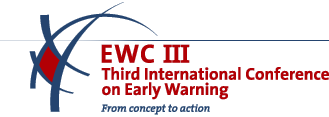
| Home | Sitemap | Legal Notices | Search |

Room G/F, 13:00 - 14:00
Background
Motivated in part by the 2004 Indian Ocean tsunami, delegates from ten African Indian Ocean countries attending the Regional Consultative Meeting on Early Warning for the East Coast of Africa (Nairobi, 17-19 October 2005), held under the auspices of the United Nations International Strategy for Disaster Reduction Africa Outreach Programme (UN/ISDR Africa), agreed the need for a voluntary association to establish a new early warning focal point or centre for their region.
Proposed Centre
It is thus proposed to establish the African Centre for Early Warning and Disaster Reduction in the Indian Ocean (“AfrEDI”), which shall be a public, non-profit organization established for the coordination and promotion of early warning and disaster risk reduction in a multi-hazard context for a specific region of the Western Indian Ocean and adjacent African mainland. To this end, a draft constitution has been developed.
Terms of Reference
Regional gaps in early warning, including in technical monitoring, data sharing, contingency plans, communications and public awareness, have been identified. In response to these gaps, the proposed terms of reference of AfrEDI focus on activities in advocacy, coordination, education, technical support and training.
Participating Countries
Comoros, Djibouti, Kenya, Madagascar, Mauritius, Mozambique, Seychelles, Somalia, South Africa and Tanzania.
Presentation
The primary goals of the presentation are to introduce the AfrEDI proposal and attract interest for technical and resource support. Introductory overviews will be provided in English and French, followed by a review of regional risks, the terms of reference of the proposed centre and the way forward. The presentation will be a team effort.